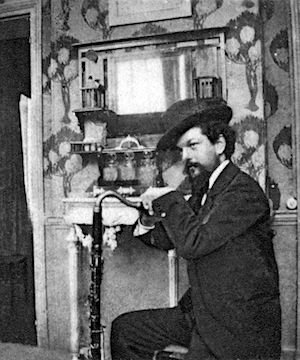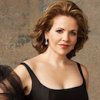
At age 52, Hershey Felder has been immersing himself in music for more than half of his life, impersonating great composers, performing their music, speaking in character. His solo bio-dramas ranged from Gershwin to Chopin to Bernstein to Rachmaninoff, and many more. Delayed by the pandemic, he has shows scheduled for next year as Sholem Aleichem and Puccini.
Felder told SF Classical Voice about his preoccupation with Claude Debussy:

“While I always identified naturally with the music and character of Chopin, was fascinated by Liszt, confounded by Wagner, astonished by Beethoven, endlessly amazed by Mozart, reduced to a puddle of tears and awe by Bach, and the list goes on, I was always in search of Debussy the man’s character, but completely in tune with his aural world. Debussy and his music became one of the most significant comforting and enigmatic relationships that I have.”
Felder is coping with the pandemic in Florence, Italy, location of his upcoming livestream performances offering intimate portrayals of the lives and music of Debussy and Tchaikovsky. Written by Felder, these pieces will be directed by Florentine cinema artist Stefano Decarli, based on original stage plays performed in the SF Bay Area and elsewhere last year. Performances of Debussy at TheatreWorks Silicon Valley in 2019 established a new all-time box-office record for the 50-year-old theater company.
Hershey Felder Presents Live will offer A Paris Love Story, about Debussy, on Nov. 22, and a holiday edition of Tchaikovsky on Dec. 20, both streamed live at 5 p.m. PST, and will remain available for a week after the livestream.

Working with Debussy’s music, Felder says what many pianists find difficult appeals to him and he finds natural, even easy to execute:
By that I mean not “easy” per se, but less puzzling. For some very strange reason, sound blending, color production, shape — it is not something I must fret over when working on Debussy. For some reason I felt at one with the music very early on. I think this is because for most of my life, I have been a dreamer, living in some kind of musical-theatrical alternate universe, that Debussy’s aural world seems to fit.
This started when I was very young, escaping family tragedy. I’d prefer to leave the details of what that complicated childhood was for the play itself, which is in fact what drives the escape into Debussy’s world — and is a true representation of what actually happened to me beginning around 11 years old and then continuing on. Not to be too cagey, it has to do with a debilitating physical illness in the family that impacted my life significantly.
It was to Debussy that I went, once having discovered him, time and again, to feel both relieved that an artist seemed to be expressing things I was feeling, and also to feel that there was an alternate world, where the unimaginable could be turned into dreams.”

Felder found Debussy “a very strange character,” and found it difficult putting the elements of his life together with the music he composed, the ridicule and lack of appreciation that he endured. “Ravel — whose music I adore, so perfectly balanced, is a clearer character to me, organized, ‘fantastic’ in the true sense of the word, approachable, significant, and expertly crafted, which seemed to represent the man. Finding Debussy became of major interest precisely because the music was so clear to me, but the man and how the music actually came about was not.”
Going deeper into his study, Felder became “astonished by the effect that Debussy’s inventions had on the musical world in general. The approach to harmony is so original. For me, Debussy seems to have no precedent even though he honors the significant classicism of Rameau et al. But the invention of Debussy is so significant, so individual, that I cannot help but wonder how and where he heard things giving us a world of aural sound that is of its own.”
Felder’s other show is based on his Our Great Tchaikovsky, with an extended focus on The Nutcracker ballet, in honor of Christmas. It also explores Tchaikovsky’s life in Italy, especially Florence, where he lived and worked. The show includes excerpts from the ballets Swan Lake and Sleeping Beauty, as well as the composer’s symphonic works.





